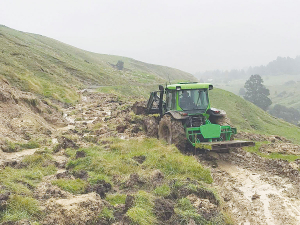"Worse than Bola!"
That's how one farmer on the North Island's East Coast described the recent storm and flooding event. It has caused severe damage to many farms and horticultural crops from Wairoa in the south of the region to Tokomaru Bay in the north.
Last week the rain stopped and the sun came out, enabling farmers and local authorities to fully assess the extent of the damage. This is still being hampered by impassable tracks.
The main damage to farms is hillside slips which have destroyed tracks and fences and wrecked thousands of hectares of pasture - especially in the steep hill country. Some horticultural crops have also been damaged especially squash and sweet corn.
Peter Andrew, a director of the Gisborne farm consultancy AgFirst, has been visiting clients right across the coast. He says in the north the worst hit area is around Tokomaru Bay, with a bit of a flowdown effect south into Tolaga Bay. He says the storm appears to have hit the coastal areas around these towns, but inland there have been slips both on farms and forestry blocks.
"But in the south and west of Wairoa it gets quite nasty and many farms have been nailed really badly by the rains. A lot of the damage is on the lower class and less productive and very steep land, which is prone to slips," Andrew told Rural News.
With tracks damaged, farmers have been unable to get out to the back on any form of motorised transport. The horse and the helicopter are the only other options.
Andrew says one positive thing is that until now there has been plenty of feed for stock, ironically due to summer rain, and overall stock are in good condition. It's time for rams to go out and one of the first jobs for farmers will be to secure their boundaries then start patching damaged fences. He says it's probably too early to make permanent repairs to fences because the ground is still wet and unstable. But even if the ground is stable, getting someone to repair or replace fences is a challenge.
"We've had these events before and there is a need for people to think long and hard about why we put in fences," Andrew explains. "It may be better to have fewer fences and put them on more stable ground so we avoid the problem of having to be always repairing them."
He says heavy machinery such as diggers are at a premium and even getting these to farms has been a problem given the state of some roads. He says the local council is setting times when heavy vehicles can use roads, thus allowing time for ongoing repairs.
In regard to slips, Andrew points out that while it is hard to reseed the slope where the soil has slipped, the material at the bottom is often quite fertile and it's relatively easy to get grass to grow in these places.
Some horticultural crops, especially processed vegetables, have suffered and some crops completely ruined. Andrew has seen a large crop of sweetcorn that, while still standing, has passed its maturity date and will be lost. He says vegetable production is touch-and-go but maize may be okay.
He says the kiwifruit harvest should be all right but warns the challenge for apple orchardists is simply getting on the wet boggy land - especially with tractors and other machines used in the harvesting operation.

















